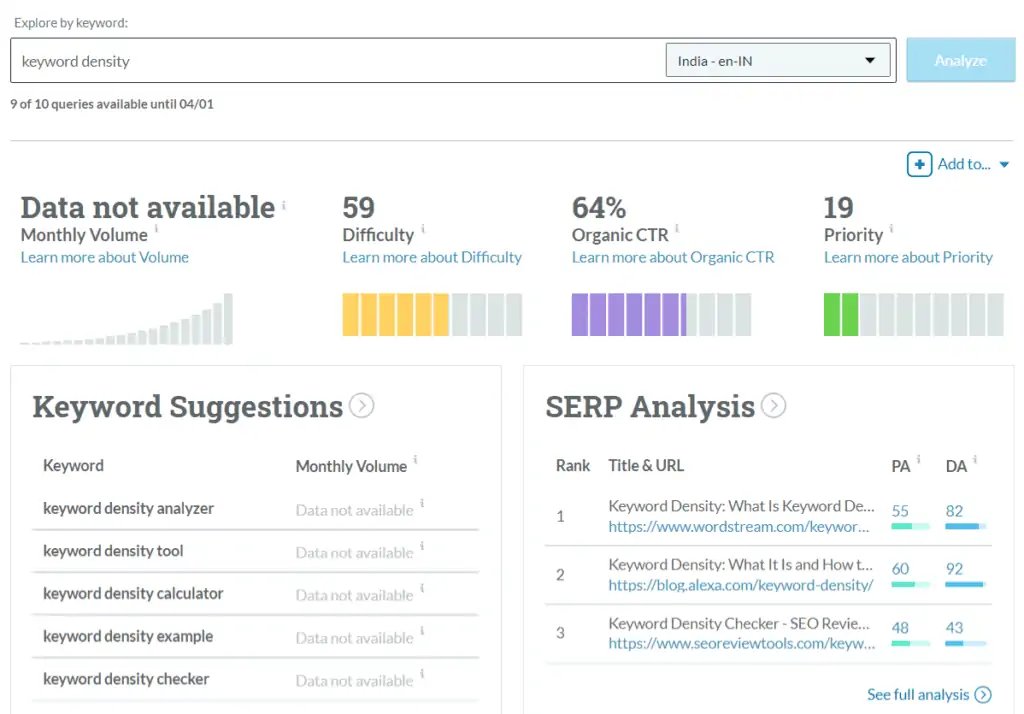Keyword density is an often-discussed Google ranking factor. While it’s not as crucial as high-quality content, backlinks, and other optimization strategies, when used correctly, it can still aid in improving your site’s search engine rankings, particularly on Google.
Let’s delve into keyword density and explore how to leverage it effectively to enhance your site’s search engine standing.
What is keyword density?
Keyword density, sometimes referred to as keyword stuffing, involves excessively cramming keywords into a piece of content. This practice is generally frowned upon by SEOs and likely disregarded by web crawlers.
In simpler terms, keyword density refers to the total frequency of keywords used within a particular piece of content. While SEOs may have differing opinions on various aspects of search engine optimization, there is a consensus that keyword density holds little significance as a ranking factor. The underlying rationale behind this concept was straightforward: incorporating keywords too frequently would elevate their relevance scores, potentially leading to duplicate content issues. However, empirical evidence suggests otherwise, as several studies have failed to establish a correlation between keyword density and search rankings.
To further complicate the matter, some SEOs adamantly believe in the importance of keyword density, citing it as a crucial ranking factor. Online searches and SEO literature often reference keyword density’s influence on rankings, albeit without substantial data to support these claims. I personally do not subscribe to the notion of keyword density as a ranking factor and deem it an unnecessary concern for new sites or pages.
Why consider keywords in your writing?
The Significance of Keywords in Content Writing
Keywords play a crucial role in content writing, influencing various aspects of your website’s performance and visibility. Here are five compelling reasons to consider keywords in your writing:
1. Search Volume and Relevance:
Keyword search volume fluctuates from month to month, reflecting the dynamic nature of user search behavior. While some users may initiate random searches, others seek specific information using precise keywords. By targeting relevant keywords with substantial search volume, you can attract a significant volume of visitors to your website.
2. Enhanced Website Traffic:
High search engine rankings are essential for attracting organic traffic to your website. Keywords contribute to achieving these rankings by aligning your content with user search queries. Effective keyword research and implementation can lead to a substantial increase in website traffic, potentially resulting in thousands of visitors per day.
3. Link Building Prowess:
Keywords can serve as powerful link-building tools. When your content resonates with users, they are more likely to link to your website, enhancing its authority and credibility. This process of attracting links through valuable content is far more effective than attempting to build links artificially.
4. Content Uniqueness and Search Engine Optimization:
Keywords aid in maintaining content uniqueness and preventing duplicate content issues. By incorporating relevant keywords naturally into your writing, you create distinct content that appeals to search engines. This approach avoids the risk of duplicate content penalties and ensures that your website remains relevant for diverse search queries.
5. On-Page SEO Optimization:
Strategic keyword placement in various elements of your website, such as title tags, heading tags (H1, H2, etc.), body content, meta descriptions, and metadata (image alt text), enhances on-page SEO. This optimization provides clear signals to search engines, facilitating accurate indexing and ranking of your pages.
In addition to these reasons, incorporating keywords into your writing fosters a more focused and structured approach to content creation. By understanding user search intent and aligning your content accordingly, you can effectively engage your target audience and achieve your website’s objectives.
To further enhance your understanding of keyword utilization and search engine optimization, I recommend exploring the 7 SEO-friendly content writing techniques for better ranking in Google.
Additional Recommendations:
- Conduct thorough keyword research to identify relevant and high-volume keywords.
- Use keywords naturally throughout your content, avoiding keyword stuffing.
- Prioritize user intent and create content that addresses user queries comprehensively.
- Regularly review and update your keyword strategy to adapt to evolving search trends.
By adhering to these guidelines, you can effectively leverage keywords to optimize your content, improve website traffic, and achieve higher search engine rankings.
How do you use keywords in your writing?

Effective Keyword Usage for Enhanced Search Engine Optimization
Long-tail keywords are crucial for ensuring that your website resonates with your target audience. To effectively utilize keywords, it’s essential to understand the appropriate frequency of their use within your content.
Importance of Keyword Usage:
Keywords play a pivotal role in search engine optimization (SEO). They act as bridges between user search queries and your website’s content. Effective keyword usage helps search engines identify and categorize your website, making it more discoverable to potential visitors.
Natural Keyword Integration:
While keywords are essential, it’s important to integrate them seamlessly into your content. Avoid keyword stuffing, which involves excessively repeating keywords in an unnatural manner. This practice can negatively impact your website’s ranking and user experience.
Strategic Keyword Placement:
Strategically place keywords throughout your website’s elements, including title tags, heading tags (H1, H2, etc.), body content, meta descriptions, and metadata (image alt text). This approach provides clear signals to search engines, facilitating accurate indexing and ranking of your pages.
Keyword Density Guidelines:
Remember that keyword density, the proportion of keywords to total words in your content, is not a strict ranking factor. However, it’s generally advisable to follow these guidelines:
- Short-tail keywords (1-2 words): Use them sparingly, typically once or twice per page, ensuring natural integration.
- Mid-tail keywords (3-4 words): Use them more frequently, 2-5 times per page, but maintain a natural flow.
- Long-tail keywords (5+ words): Use them strategically, once per paragraph or section, to provide context and specificity.
Avoiding Excessive Keyword Usage:
Excessive keyword usage can trigger search engine spam filters, potentially harming your SEO efforts. Avoid practices like:
- Keyword stuffing: Excessively repeating the same keyword in unnatural ways.
- Keyword clustering: Grouping too many keywords together in a single sentence or paragraph.
- Keyword synonyms: Using too many synonyms of the same keyword, making the content repetitive.
Prioritizing User Intent:
Always prioritize user intent when using keywords. Understand what your target audience is searching for and tailor your content accordingly. Use keywords naturally to address their queries and provide valuable information.
Regular Keyword Strategy Review:
Search trends evolve over time, so it’s crucial to regularly review and update your keyword strategy. Utilize keyword research tools to identify new relevant keywords and adapt your content accordingly.
Does keyword density still matter today?
The short answer is yes, keyword density still matters for SEO to an extent. However, there is some confusion around what constitutes keyword density and how it’s used today in search engine rankings.
While many SEO experts claim keyword density is no longer a crucial ranking factor, it doesn’t mean you should entirely disregard the practice of including relevant keywords throughout your content. Here are two key points to understand about keyword density that will help you leverage SEO effectively for your business:
- Keyword Density: An Evolving Concept:
Keyword density has undergone a significant transformation over time. Initially, it was a primary ranking factor for Google, but with the evolution of search engine algorithms, its influence has diminished. However, it still holds relevance for SEO.
- Balanced Keyword Usage:
While keyword density is not as critical as it once was, it remains an important aspect of your website’s SEO strategy. While you can rank well without obsessing over keyword density, incorporating relevant keywords throughout your content can enhance your chances of appearing in search results. However, maintain a balanced approach; excessive keyword usage can trigger over-optimization penalties from Google, adversely affecting your rankings.
In summary, keyword density still plays a role in SEO, but its impact has lessened compared to its earlier prominence. Focus on creating high-quality, informative content that aligns with user intent, and naturally incorporate relevant keywords throughout your text. Avoid keyword stuffing or excessive keyword repetition, as this can harm your SEO efforts.
Tools for keyword density analysis
There are many tools to help you analyze your site’s keyword density. One example is . This tool allows you to enter up to 10 seed keywords and then shows you how many times those keywords appear on your site, as well as their average keyword density (how often they appear per page).

For instance, if you enter “weight loss” as one of your keyword seeds, Keyword Explorer will display all of your pages that contain that keyword.
Beneath those results, Keyword Explorer provides even more detailed information about that page and its content:
- Total word count: This indicates the number of words on the page.
- Keyword frequency: This shows how many times each word appears on the page, providing an indication of which words hold the most significance for optimizing for that keyword.
- Individual word statistics: This offers statistics for each individual word, including whether it appears in all caps or not. This information can be useful for incorporating more synonyms into your content without making it appear spammy.
Keyword Explorer’s keyword density analysis tool is a valuable resource for identifying areas where you may be over- or under-using keywords, ensuring that your website is optimized for search engines.
Best practices to Avoid Keyword Stuffing
To prevent your copy from being perceived as keyword stuffing, remember one crucial aspect: your content must be valuable.
Content should address problems and provide solutions for readers. If it accomplishes this, it becomes apparent why it deserves backlinks from others. However, if you cannot demonstrate its value to users, all your keywords in the world will not save you from a Google penalty.
The most effective way to avoid keyword stuffing penalties is to prioritize delivering value. This is what makes your content compelling and why people link to it in their own posts. Implement a keyword research strategy and then place keywords where they naturally belong and where they provide actual value.
Here are some best practices to follow:
- Assign a focus keyword to each blog post.
- Write in-depth articles that cover all aspects of the topic.
- Incorporate LSI keywords and long-tail keyword variations into your articles.
- Use keywords in key areas like the title, meta description, first paragraph, body, image alt-text, and headings.
- Write content to address user queries and solve their problems, rather than focusing solely on ranking high in search results.
- Avoid repeating the same words repeatedly; instead, use synonyms and related terms.
Final Overview
This post provides a comprehensive examination of keyword density, explaining its nature and its influence on on-page SEO. Keyword density is one of the most misunderstood and confusing concepts in keyword optimization.
To effectively utilize keyword density for improved SERP rankings, remember to strike a balance between keyword placement and avoid keyword stuffing.
If you’re interested in optimizing the on-page SEO of your website, feel free to contact me here.
